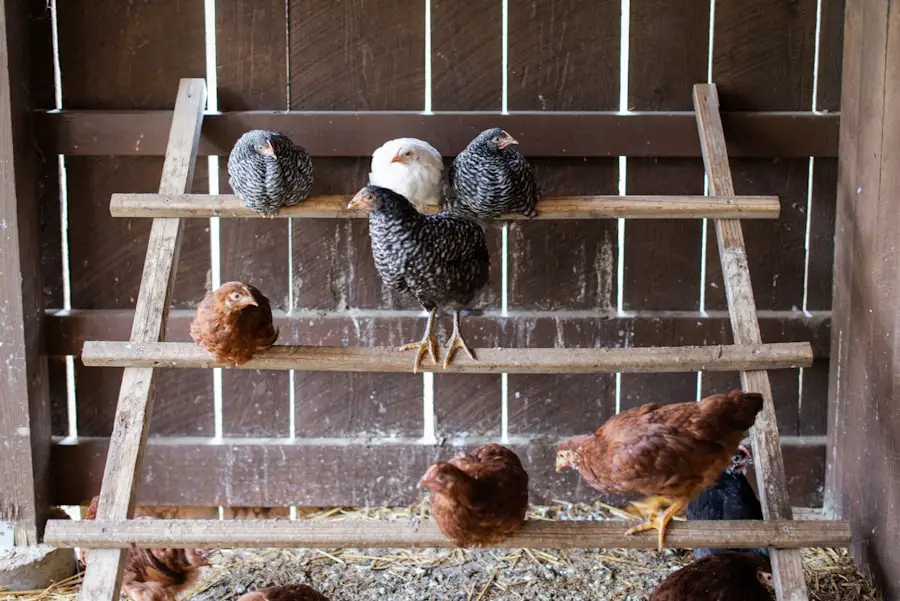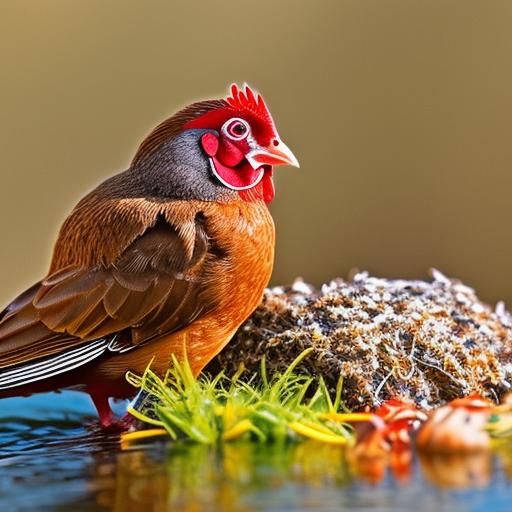Keeping chickens has a long history that dates back thousands of years. Chickens were first domesticated in Southeast Asia around 6000 BC and have since spread to every corner of the globe. Initially, chickens were primarily kept for their meat and eggs, but over time, they have become popular as pets and for their ornamental value as well.
There are many reasons why people choose to keep chickens. For some, it is a way to have a sustainable source of fresh eggs. Others enjoy the companionship and entertainment that chickens provide. Some people keep chickens for their natural pest control abilities, as they eat insects and other pests in the garden. Additionally, chickens produce nutrient-rich manure that can be used as fertilizer for gardens.
Key Takeaways
- Keeping chickens has many benefits, including fresh eggs, natural pest control, and fertilizer for your garden.
- When choosing a chicken breed, consider factors such as egg-laying ability, temperament, and climate adaptability.
- Building a chicken coop requires careful planning and consideration of factors such as size, ventilation, and predator protection.
- Chicken coop design and features should include nesting boxes, roosting bars, and easy access for cleaning and maintenance.
- Feeding and watering chickens requires a balanced diet and clean water, with options for free-range grazing and supplemental treats.
Benefits of Keeping Chickens
One of the main benefits of keeping chickens is having a constant supply of fresh eggs. Unlike store-bought eggs, which can be weeks old by the time they reach your kitchen, homegrown eggs are incredibly fresh and flavorful. They also tend to have a richer yolk color and a firmer texture.
Chickens are also excellent natural pest control agents. They love to eat insects, slugs, snails, and other pests that can damage your garden. By allowing your chickens to free-range in your yard or garden, you can significantly reduce the need for chemical pesticides.
In addition to providing fresh eggs and pest control, chickens also produce high-quality fertilizer for your garden. Chicken manure is rich in nitrogen, phosphorus, and potassium, which are essential nutrients for plant growth. By composting chicken manure and adding it to your garden soil, you can improve soil fertility and promote healthy plant growth.
Keeping chickens can also be an educational opportunity for children. They can learn about responsibility by taking care of the chickens and collecting eggs. They can also learn about the life cycle of chickens and witness firsthand the process of hatching eggs and raising chicks.
Choosing the Right Chicken Breed
When it comes to choosing the right chicken breed, there are several factors to consider. First, you need to think about the climate in your area. Some breeds are better suited for cold climates, while others thrive in hot climates. You also need to consider the space you have available. Some breeds are more suited for small backyard flocks, while others require more space to roam.
For beginners, there are several popular chicken breeds that are known for being easy to care for and friendly. Some of these breeds include the Rhode Island Red, Plymouth Rock, and Sussex. These breeds are known for their docile temperament, good egg production, and hardiness.
When it comes to purchasing chickens, there are several options available. You can buy them from a local farm or hatchery, or you can order them online and have them shipped to your door. It’s important to choose a reputable source that raises healthy chickens and provides proper care and nutrition.
Building a Chicken Coop
Building a chicken coop is an essential part of keeping chickens. The coop provides shelter and protection from predators, as well as a safe place for the chickens to roost and lay eggs.
When building a chicken coop, you will need some basic materials such as wood, nails, screws, wire mesh, and roofing materials. The size of the coop will depend on the number of chickens you plan to keep. As a general rule of thumb, each chicken should have at least 4 square feet of indoor space and 10 square feet of outdoor space.
The location of the coop is also important. It should be placed in an area that is well-drained and away from any potential sources of contamination such as standing water or sewage. It should also be easily accessible for cleaning and maintenance.
Safety considerations are crucial when building a chicken coop. The coop should be predator-proof, with secure doors and windows that can be locked at night. The floor should be covered with a layer of bedding material such as straw or wood shavings to provide insulation and absorb moisture.
The cost of building a chicken coop can vary depending on the size and materials used. On average, you can expect to spend between $200 and $500 for a basic coop. However, if you choose to add additional features such as automatic doors or solar-powered lighting, the cost can increase.
Chicken Coop Design and Features
When designing a chicken coop, there are several features that you should consider. First, you will need nesting boxes where the chickens can lay their eggs. Each nesting box should be about 12 inches square and filled with clean straw or wood shavings.
Roosting bars are also essential for chickens to sleep on. These should be placed at least 18 inches above the ground and spaced about 12 inches apart. The bars should be wide enough for the chickens to comfortably grip with their feet.
Proper ventilation is crucial in a chicken coop to prevent the buildup of ammonia from chicken droppings and to regulate temperature and humidity levels. You can achieve this by installing windows or vents that can be opened and closed as needed.
Lighting is another important consideration in a chicken coop. Chickens need about 14-16 hours of light per day to maintain optimal egg production. If natural light is not sufficient, you can install artificial lighting using LED bulbs.
Feeding and Watering Chickens

Chickens have specific dietary needs that must be met to keep them healthy and productive. The main component of their diet is a balanced chicken feed that provides all the necessary nutrients. There are different types of feed available, including pellets, crumbles, and mash. It’s important to choose a feed that is appropriate for the age and breed of your chickens.
The amount of feed to give your chickens will depend on their age and size. As a general guideline, adult chickens will eat about 1/4 to 1/3 pound of feed per day. It’s best to divide the daily ration into two meals, one in the morning and one in the evening.
In addition to feed, chickens also need access to fresh water at all times. There are different types of watering systems available, including gravity-fed waterers and nipple waterers. It’s important to regularly clean and refill the waterers to prevent the growth of bacteria.
Treats can also be given to chickens in moderation. Some popular treats include fruits, vegetables, mealworms, and scratch grains. However, it’s important not to overdo it with treats, as they should only make up about 10% of the chickens’ diet.
Chicken Health and Hygiene
Keeping your chickens healthy is essential for their well-being and productivity. There are several signs that indicate a healthy chicken, including bright eyes, clean feathers, and a good appetite. It’s important to regularly check your chickens for any signs of illness or injury.
Common health issues in chickens include respiratory infections, parasites, and egg-laying problems. To prevent these issues, it’s important to provide a clean and dry environment for your chickens. Regularly cleaning the coop and providing fresh bedding will help prevent the buildup of bacteria and parasites.
Parasite control is also important in chicken keeping. Chickens can be affected by external parasites such as mites and lice, as well as internal parasites such as worms. Regularly inspecting your chickens for signs of parasites and treating them accordingly will help keep them healthy.
Egg Production and Collection
Chickens typically start laying eggs at around 5-6 months of age, although this can vary depending on the breed. Most chickens will lay eggs consistently for about 2-3 years before their egg production starts to decline.
There are several signs that indicate a healthy egg. The shell should be clean and intact, with no cracks or deformities. The yolk should be bright yellow or orange and should not have any blood spots. The white should be clear and not cloudy.
To collect eggs, it’s best to check the nesting boxes at least once a day. Gently remove the eggs and place them in a clean container. It’s important to handle the eggs with care to prevent any damage to the shell.
Eggs can be stored in a cool, dry place for up to a month. It’s best to store them with the pointed end down to help maintain freshness. Before using the eggs, it’s important to wash them with warm water and mild soap to remove any dirt or bacteria.
Chicken Behavior and Socialization
Understanding chicken behavior is important for their well-being and for maintaining a harmonious flock. Chickens are social animals and thrive in groups. It’s best to keep at least three chickens together to prevent loneliness and aggression.
Socializing chickens from a young age is important to ensure they are friendly and comfortable around humans. Spending time with your chickens, talking to them, and offering treats can help build trust and create a bond.
Dealing with aggressive chickens can be challenging. It’s important to identify the root cause of the aggression, whether it’s due to overcrowding, dominance issues, or external stressors. Separating the aggressive chicken from the flock temporarily may help resolve the issue.
Common Problems and Solutions in Chicken Keeping
Predators are one of the biggest challenges in chicken keeping. Common predators include raccoons, foxes, coyotes, and hawks. To protect your chickens from predators, it’s important to secure the coop with sturdy fencing and wire mesh. You can also use motion-activated lights or alarms to deter predators.
Egg-eating chickens can also be a problem in some flocks. This behavior can be caused by boredom, nutritional deficiencies, or overcrowding. Providing plenty of enrichment, a balanced diet, and enough nesting boxes can help prevent egg-eating.
Molting is a natural process in which chickens shed their old feathers and grow new ones. During this time, chickens may stop laying eggs and appear scruffy and unkempt. Providing a balanced diet and extra protein can help support the molting process.
Winter care is important for chickens, especially in cold climates. It’s important to provide adequate insulation in the coop and to protect the chickens from drafts. Providing extra bedding and ensuring access to fresh water at all times is also crucial.
Keeping chickens can be a rewarding and enjoyable experience. Not only do they provide fresh eggs, natural pest control, and fertilizer for your garden, but they also offer educational opportunities for children. By choosing the right breed, building a suitable coop, and providing proper care and nutrition, you can create a thriving flock of chickens. If you’re considering keeping chickens, there are many resources available online and in books that can provide further information and guidance. So why not give chicken keeping a try? You may find that it’s a hobby that brings you joy and satisfaction for years to come.
If you’re interested in keeping chickens, you’ll definitely want to check out this informative article on the best flooring options for your chicken coop. Choosing the right flooring is crucial for the health and well-being of your feathered friends. This article from Poultry Wizard provides valuable insights and tips on different types of flooring materials, such as straw, wood shavings, and sand, and their pros and cons. To learn more about creating a comfortable and hygienic environment for your chickens, click here: https://poultrywizard.com/keeping-chickens/floor-of-chicken-coop/.
FAQs
What are the benefits of keeping chickens?
Keeping chickens can provide a source of fresh eggs, natural pest control for your garden, and fertilizer for your plants. They can also be great pets and provide entertainment.
What do chickens need to be healthy?
Chickens need access to clean water, a balanced diet of feed, and a safe and comfortable living space. They also need protection from predators and regular health check-ups.
How much space do chickens need?
Chickens need at least 4 square feet of indoor space and 10 square feet of outdoor space per bird. However, more space is always better for their health and well-being.
What kind of housing do chickens need?
Chickens need a secure and dry coop with proper ventilation, nesting boxes for laying eggs, and roosting bars for sleeping. The coop should also be easy to clean and maintain.
What do chickens eat?
Chickens need a balanced diet of commercial feed that includes protein, carbohydrates, vitamins, and minerals. They also enjoy treats such as fruits, vegetables, and grains.
How often do chickens lay eggs?
Chickens typically lay one egg per day, but this can vary depending on the breed, age, and season. Some chickens may lay more or less frequently.
What are some common health issues for chickens?
Common health issues for chickens include respiratory infections, parasites, and egg-laying problems. Regular health check-ups and proper care can help prevent these issues.
Meet Walter, the feathered-friend fanatic of Florida! Nestled in the sunshine state, Walter struts through life with his feathered companions, clucking his way to happiness. With a coop that’s fancier than a five-star hotel, he’s the Don Juan of the chicken world. When he’s not teaching his hens to do the cha-cha, you’ll find him in a heated debate with his prized rooster, Sir Clucks-a-Lot. Walter’s poultry passion is no yolk; he’s the sunny-side-up guy you never knew you needed in your flock of friends!







